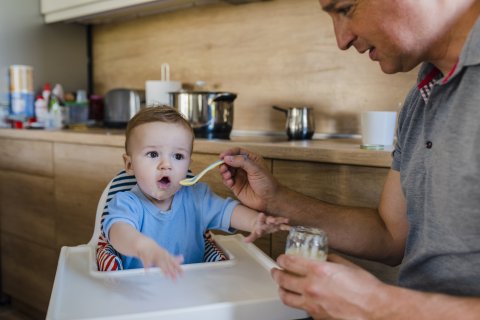COVID-19 pandemic provides opportunity for gender equality in the Netherlands
Fathers doing more childcare during the pandemic, study finds
A study by sociologists Mara Yerkes and Chantal Remery from Utrecht University suggests that fathers started caring more for their children during the coronavirus pandemic. In conjunction with researchers from the University of Amsterdam and Radboud University, Yerkes and Remery are conducting the COGIS-NL study, looking at gender equality during the pandemic. Yerkes explains: ‘In April, during the national lockdown in the Netherlands, 22% of fathers reported caring more for their children than prior to the pandemic. In June, this figure rose to 31%.’

But the increase in father’s share of childcare does not mean that care for children is now more equally distributed between fathers and mothers. Yerkes continues: ‘Mothers have always provided more childcare, and continue to do so. Among the parents who said they were providing more hours of childcare each week than before the pandemic, fathers reported an increase of 10.5 hours per week, while mothers reported doing an additional 14.5 hours a week.’ Dutch parents reported being reasonably happy with this division of care. ‘Fathers rate the current division at 7.4 out of 10, mothers at 7.1.’
Combining work and care
Yerkes and her colleagues asked parents about their experiences of combining work and care. ‘Parents with children in both primary and secondary school had more difficulty combining work and care in June than those who only had primary-school-age children.’ In April, however, it was precisely this second group who had the most trouble combining work and care. ‘This difference can be ascribed to the fact that primary schools opened up completely in June, whereas secondary schools did not.’
Employees without any children under 18 at home were twice as likely to report difficulty in combining work with care and support for those around them in June (21% in June compared to 10% before the pandemic).
40% of mothers continue to report experiencing a higher workload.
Higher perceived work pressure
The researchers also looked at the perceived work pressure among parents. Yerkes: ‘During our first survey in April, 39% of mothers reported higher work pressure than prior to the pandemic. Based on our most recent figures, the situation did not improve by June despite the complete reopening of primary schools and childcare centres – 40% of mothers continued to report experiencing a higher workload.’ The researchers did identify a drop among fathers, however: in April, 31% reported more work pressure than before the pandemic, which decreased to 26% in June.
The impact of the pandemic on work, care and well-being
The COGIS-NL (COVID Gender (In)equality Survey Netherlands) researchers have written a second policy brief, presenting their key research findings from June 2020. They examine the key differences between men and women when it comes to work, care and well-being. Their brief answers questions such as: How are household tasks distributed between men and women? And: How satisfied are partners with their relationship during the coronavirus pandemic?

